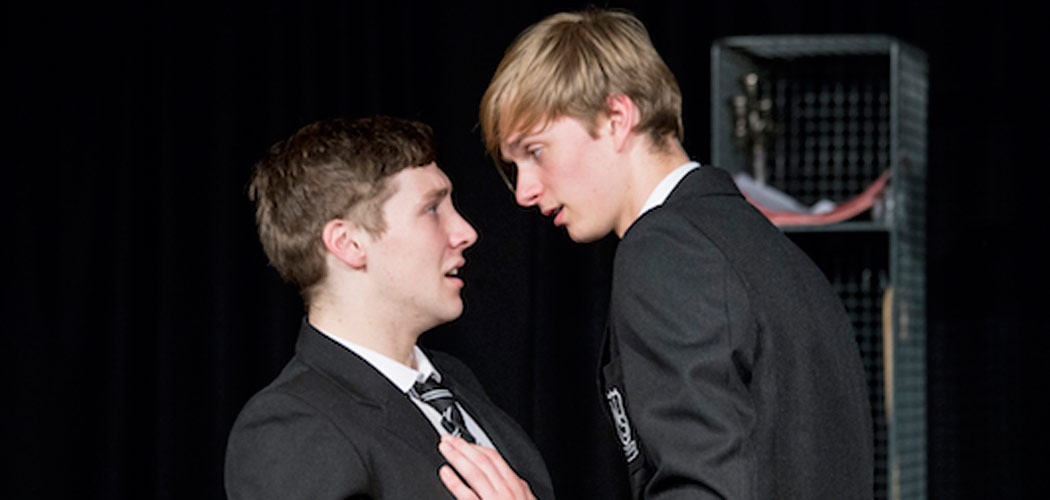Lord Dismiss Us, a new play by Glenn Chandler, based on the classic novel by Michael Campbell, set in a boarding school just before the partial decriminalisation of homosexuality it lifts the lid on this secret world of 1967. Dave Cross spoke to Glenn about this fascinating story.

Hi Glenn, what made you want to adapt the novel by Michael Campbell?
I read the novel under the bedclothes when I was a teenager. It struck a chord because I was a public school boy in Edinburgh, and it was an all-male institution in which homosexuality was rife. I have to say, very little of it came my way! But it stayed with me as it was a very accurate portrayal of the hothouse relationships and emotions that occur within the walls of such a quintessential boarding school.
And it was published at a key time?
Yes, 1967 – was also the year homosexuality was partially decriminalised in England and Wales, which no-one can deny was an important milestone in LGBT history. The fiftieth anniversary of this, and the book’s publication, seemed the perfect time to revisit Michael Campbell’s classic story which amazingly for its time had a very positive message. Other books of that era gave the impression that gay relationships always had to end in shame, despair and suicide, but Lord Dismiss Us presented a central character who at eighteen was prepared to leave school and not be afraid to live as a gay man, in spite of the fact he would be breaking the law until he turned 21. The play takes us back to that time, half a century ago, and as such is a valuable history lesson. But it’s also extremely funny and the idea of creating a drama which is laced with humour always appeals to me. Christopher Isherwood described it as the finest novel ever written about public school life. An adaptation has been long overdue.
How similar is the play to the novel?
There were an awful lot of characters in the novel, some of which didn’t do a great deal to carry the story forward, and some were quite thinly drawn, so I had to cut some and concentrate on the main protagonists. The main thrust of the story is there, the love affair between a senior prefect and a sixteen year old junior, and the attempts of a new headmaster to stamp out such relationships, a lost cause if ever there was one.
Did you need to adapt the dialogue or language much, so that it works for a 2017 audience?
The dialogue and language needed very little adaptation as Michael Campbell’s writing is so beautiful. When we took the play to the Edinburgh Fringe this year audiences were roaring with laughter one minute and cheering our hero on the next.
What is the basic story of the play?
A new headmaster and his formidable Lady Macbeth of a wife take over the running of Weatherhill, a boys boarding school. From the outset they are aware that all is “not well”. Pairs of boys frequently drift off into the surrounding woods with bearskin rugs – one explains he was simply taking a thorn out of the other’s foot – and fourteen masters have the effrontery to be bachelors! The play charts the attempts of the head and his wife to stamp out moral degeneracy, not only among the boys but the staff as well. This bodes badly for prefect Terry Carleton and his young lover Nicky Allen, for an English master struggling with his inner demons, and a school chaplain who implores boys to “fight the good fight” while having lost his own a long time ago.

Can you talk us through the lead characters?
Terry Carleton and Nicky Allen are the central characters among the boys, Terry is on the cusp of leaving school and wants to be a writer, Nicky intends going into the church like his wealthy clergyman father. Though Terry wants their love to go on for ever, it’s clear from the outset that Nicky has other ideas. English master Eric Ashley, who encourages him in his writing, warns him that he when he leaves school he will be a criminal, as the law has not yet changed and even when it does he will not be legal until he is 21. And the chaplain, the Reverend Cyril Starr, tells Nicky in confirmation classes to resist the carnal desires of the flesh. But it’s the action of the Crabtrees which create much of the drama and the comedy. Philip Crabtree, the new head, is determined to earn himself a legacy by getting rid of everyone known to be indulging in homosexual acts, while his wife Cecilia fawns over the handsome chaplain, blissfully unaware that the object of her desire prefers his own sex. The scene is set for a purge, and school captain John Steel is set the task of compiling a list of offenders, an odious duty that eventually pricks his conscience. Love wins out however. The hilarious climax of the story is the school play, written by the school chaplain, enacted in front of the new governors, in which the boys take a terrible revenge on the headmaster.
Sexuality in young people of any gender is a tricky subject and especially in the current climate, but your play is not about abuse, can you talk about this?
The play (and the book) is more about the sexual awakening of young people and the attempts of authority to stamp it out. The masters who are gay are quite enlightened and supportive and as terrified as the boys are of being found out. There is only one moment where a master crosses the line and it is the most moving and dramatic part of the play. In Edinburgh a party of school teenagers gasped in shock, but what happens comes out of deep felt emotion.
Tickets from abovethestag.com
Above the Stag Theatre, 17 Miles Street, Vauxhall, SW8.














